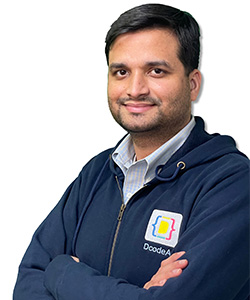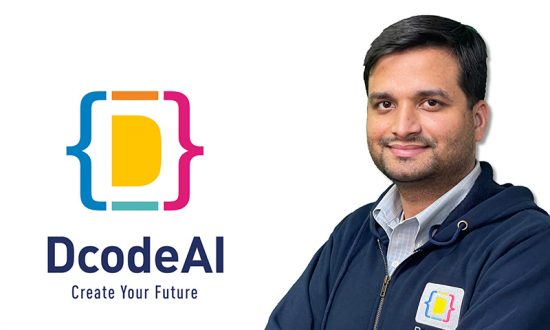Kartik Sharma has many feathers in his cap. A technology evangelist having experience in building disruptive technology products and high-performing product teams, he is an AI practitioner with expertise in leveraging Machine Learning to develop conversational bots and other RPA-related solutions. He is the Co-Founder of DcodeAI (www.dcodeai.com) and a pioneer in setting up Agnitio (www.agnitio.in), which is a KPMG Hot 100 awardee. “Our universities need to be at the forefront of the cutting-edge technologies so that the students coming out of them are prepared for an AI-ready future,” opines Kartik Sharma. In a conversation with Higher Education Digest, Kartik Sharma talks about widening the incorporation of AI as an academic discipline, his plan in rejuvenating higher-education institutions for the development of AI, and much more.
As higher-education reforms are underway in India to foster AI talent, what are your thoughts on widening the incorporation of AI as an academic discipline?
Artificial Intelligence has become a strategic imperative for worldwide economic growth and will continue to be one of the most crucial technologies of the future. Given its impact, there is a need for coordinated efforts by academic institutions and the industry to address the gap between the demand and supply of AI-related skills. Last year, Education Minister Ramesh Pokhriyal Nishank announced that India will be the first country in the world to introduce Artificial Intelligence in the school curriculum in VI standard. This is a meaningful step towards enabling India’s future workforce to become digitally empowered and effectively utilize emerging technologies to solve pressing local and global challenges.
I have been personally involved as a subject matter expert with APJ Abdul Kalam Technical University (AKTU) in setting up AI courses for first-year undergraduate students. I feel more and more higher education institutions will adopt it in the coming years.
What is your action plan in rejuvenating higher-education institutions to develop AI talent, whether in industry or academia?
We believe that we should take a top-down approach here, ensuring that all the leadership and academic faculty members learn AI and become more aware of AI applications and job opportunities. This will lead to greater sensitization of AI in the education ecosystem. There needs to be greater collaboration between academia and industry to promote students working on hands-on live projects and solve real-world problems. Ultimately, the industry will also benefit from the AI-ready workforce of the future. The universities should also setup AI Research and Development centres and stimulate joint initiatives with such tech startups. This will help set the tone for a seamlessly integrated curriculum in the country’s higher education system.
Elaborate on the courses offered by DcodeAI and the business model it follows.
At DcodeAI, we are holistically looking at providing courses on Statistics, Python, Data Science, Computer Vision, and Natural Language Processing as integrated components of AI, which makes us unique in this space. The curriculum is aligned to CBSE standards and is covering various practical aspects of the topics as well.
We work collaboratively with educational institutions to help in capacity building for AI learning, conduct workshops and provide the DcodeAI platform to both students and teachers. DcodeAI focuses on low code/no-code tools and usage of AI to make learning easy, intuitive and personalized. Hence, even those without any coding background can start to learn and implement AI models.
In India’s context, what are the major challenges and opportunities you foresee in this domain?
In 2020, we witnessed multiple disruptions in the country’s education system and the overall learning and development process of the students, especially with the integration of AI in our education system. I believe that data is a key component in the success of AI initiatives. This data is mostly in unstructured format and lying in disparate systems or even offline in India. Putting this all together is the foundation stone for AI to be successful, we also need to get the technology infrastructure right as the world moves towards 5G and Quantum computing. Our universities need to be at the forefront of these cutting-edge technologies so that the students coming out of them are prepared for an AI-ready future.
Has there been a rise in AI adoption in India amidst pandemic, especially in the education sector?
Academia is experiencing massive reforms globally amid lockdown in COVID-19 outbreak. The COVID-19 pandemic is also proving to be a constructive disruptor, giving an opportunity for restructuring the present conventional, classroom-based educational system to AI-enabled system and subjects.
We have witnessed rapid growth in the past year with parents looking for opportunities to engage their kids in meaningful activities such as coding, learning emerging technologies such as AI and so on. We have been focused on building a strong product and training support ecosystem. Our approach in 2021 is to continue building relationships with educational institutions and strategically align with the teacher community to deliver AI experiences with practical hands-on projects and integrated industry interface.
What are some of the achievements that were brought in recently on the platform?
We have successfully implemented all the five key modules of AI – Statistics, Python, Data Science, Computer Vision, Natural Language Processing. We have started implementation in a few schools in NCR and have received very encouraging feedback. We have also been doing webinars and engaging with thousands of teachers for enabling them to be AI-ready, with a primary focus on using AI to teach AI leveraging low code / no-code tools. We use DIY activities and projects at each stage and provide an industry interface for learners to solve actual real-life problems.
We are focused on deepening our ties with AI startups and subject matter experts to provide hands-on experiences and projects. We also want to create the largest community of AI educators in the world wherein educators can connect, share and learn together.
More About Kartik Sharma

Kartik is a member of the All-Party Parliamentary Group on Artificial Intelligence (APPG AI), UK, which explores the impact and implications of AI. He is also a member of the FICCI Edtech task force that focuses on using technology in India’s learning process. A Leadership Fellow at the prestigious St. George’s House, Windsor Castle, UK, he is also a member of the Institute of Directors, UK, and student mentor. He is an executive board member of the AIMA Young Leaders Council.
He is a mentor with NASSCOM’s WOMEN WIZARDS RULE TECH (W2RT) program and Atal Innovation Mission of the Government of India. He has been a guest lecturer/mentor at various educational and training institutes worldwide, such as IIT, ISTD, NIPM, SHRM, IIM, LSBU London, IMT, VIPS, DSB, etc. Besides, Kartik is also a silver medallist from the prestigious Indian Institute of Technology.




